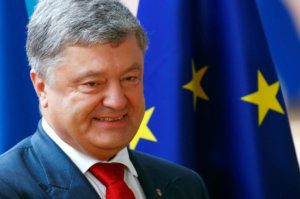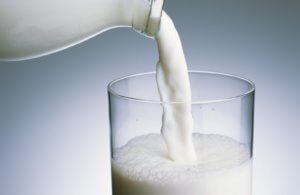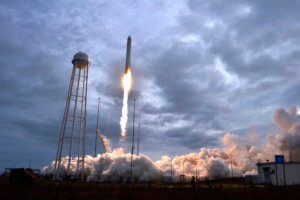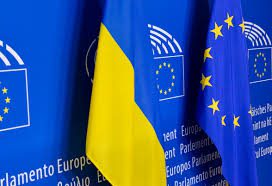
President Petro Poroshenko of Ukraine has signed the law on ratification of a memorandum of mutual understanding between Ukraine and the European Union on the allocation to Ukraine of macrofinancial assistance from the European Union to the tune of EUR 1 billion, the presidential website said. By implementing the memorandum, Ukraine will be able to receive additional funding from the EU to the tune of EUR 1 billion to be used for purposes stated in the national budget.
In order to receive each of the two tranches of the EU’s financial assistance to the tune of EUR 500 million each, Ukraine must meet certain conditions that have been agreed upon by the parties in such areas as tax and customs policy, fighting corrupting, small-scale privatization, management of state-run enterprises, corporate management in state-owned banks and banking supervision, and further reforms in power industry, health care, and social care.
As was earlier reported, the Verkhovna Rada ratified the memorandum on November 8, 2018.
The agreements were signed in Kyiv on September 14, 2018, following President Poroshenko’s earlier agreements with leaders of EU institutions as a result of the East Partnership Summit that took place in Brussels on November 23, 2017, and the 20th Ukraine-the EU summit that was held in Kyiv on July 9, 2018.
LAW, MACROFINANCIAL ASSISTANCE, MEMORANDUM, POROSHENKO, RATIFICATION, UKRAINE-EU

Milkiland, a dairy group with assets in Ukraine, Russia and Poland, in January-September 2018 saw EUR 13.42 million of net loss compared with EUR 4.55 million of net profit a year ago.
According to an unaudited report of the group posted on the website of the Warsaw Stock Exchange (WSE), revenue over the period fell by 6.6%, to EUR 98.8 million, and gross profit – by 24.4%, to EUR 15.92 million. Earnings before interest, taxes, depreciation and amortization (EBITDA) grew 1.8-fold, to EUR 4.38 million.
Milkiland in January-September 2018 saw EUR 3.41 million of operating loss compared with EUR 3.01 million of operating profit a year ago.
The loan portfolio of the group was EUR 86.2 million as of September 30, 2018 compared with EUR 86.6 million as of late 2017, mainly thanks to repayment of the indebtedness under the restructuring agreements with Ukrainian and Polish banks. Net debt of the group declined by 1%, to EUR 85.7 million as of September 30, 2018.
The Russian market provided for EUR 59.53 million of the group’s revenue, the Ukrainian market – EUR 28.93 million and the Polish market – EUR 10.47 million.
Cheese & butter segment contributed approximately 38% to the group’s total revenue. Segment’s revenue increased by 19% to EUR 37.34 million, the whole-milk dairy segment – EUR 47.33 million (48% of total revenue) and the ingredients segment – EUR 14.26 million (14%).
“In 9M 2018 Milkiland Ukraine focused on the development of sales of high value-added products, including innovative lactose-free cheese and whole milk products, primarily in the key accounts channel. The company also paid an attention to production and export sales of Kosher dry milk products and butter under the contract with key client from Israel,” the company said.
In 9M 2018 Milkiland put additional efforts aimed at the entering to new and development of the sales at the existing export markets. In line with these efforts, Milkiland Intermarket continued a development of the distribution network of the group’s dry milk products and butter in China. Additional volumes of cheese-like products were sold to the traditional market of the group in Kazakhstan, as well as other Central-Asian countries. The company also continued a fulfillment of the Kosher goods supply contract with the key client in Israel.

The launch of the Antares carrier rocket, created by the American Orbital ATK Corporation with the participation of Ukrainian enterprises, has been carried out from the NASA Wallops Flight Facility in the United States, Ukrainian ambassador to the U.S. Valeriy Chaly has said. The Antares rocket is a successful example of interaction between the Ukrainian and U.S. space companies in the field of peaceful space exploration, the ambassador said on his Facebook page.
“Thus, the main construction of the first degree rocket was developed by the Yuzhnoye Design Bureau and manufactured at the Makarov Southern Machine-Building Plant in cooperation with the Ukrainian enterprises Khartron-Arkos, Khartron-UKOM, Rapid, etc. Ukrainian specialists took an active part in the tests of Antares, which were conducted in the United States,” Chaly said.
“It is this rocket that should deliver the Cygnus automated cargo spacecraft to the International Space Station,” he added.
The ambassador recalled that in June 2018, the American company Orbital ATK, Ukraine’s partner in this project, became a division of one of the most powerful defensive corporations in the United States — Northrop Grumman Inc.

The delegation of the National Democratic Institute (U.S.) and deputies of the European Parliament have prepared 51 recommendations to get ready for the 2019 elections in Ukraine, in particular, they recommended Facebook opening an office in Kyiv, regional director of programs of the Eurasian region at the National Democratic Institute Laura Jewett has said.
Facebook should open an office in Ukraine and, together with other digital platforms, unite to fight disinformation … If we are talking about fighting Kremlin interference to ensure stability in the country, then social networks and digital platforms should help Ukraine in these aspirations. All candidates must have equal access to the media. You also need to combat with the negative impact of misinformation. It is necessary to make efforts to combat manifestations of political corruption, including falsification, and to monitor the financing of parties, she said at a press conference in Kyiv on Saturday.
According to Jewett, it is also necessary to adhere to the equal gender representation of women and men.
Candidates’ campaigns should rest on constructive proposals, be aimed at unification, and the media should note that this is political advertising, not information, she explained.
In turn, MEP Dariusz Rosati noted the intensification of misinformation in Ukraine.
Our recommendations are aimed at encouraging the Ukrainian authorities to adopt key reforms in the electoral legislation and beyond, which will help ensure that the elections are fair and transparent, he explained.
MEP Rebecca Harms clarified that the need to introduce a proportional electoral system instead of a mixed one had been discussed at a meeting with Ukrainian Parliament Speaker Andriy Parubiy.
After the meeting with the CEC (Central Electoral Commission) we recommended the parliament include internally displaced persons and labor migrants in the electoral process, she added.
In addition, the delegation recommended that resources be provided to the CEC for updating technical tools to combat cyber attacks.

Ukraine in 2018 would enter the top ten world’s largest exporters of dairy products, First Deputy Agricultural Policy and Food Minister of Ukraine Maksym Martyniuk has said.
“Livestock breeding has begun to develop in our country. According to preliminary statistics, this year we will enter the world’s top ten exporters of dairy products. Our milking rates are growing. Animal productivity is growing, which is a good trend that needs to be supported next year,” he said at a solemn meeting devoted to the Day of Agricultural Workers in Kyiv on Thursday.
According to him, the ministry in 2019 will keep the system of state support for the agro-industrial complex and take into account the “mistakes made this year.”
“We will change the money delivery mechanisms so that as many entities working in the agrarian business as possible get these funds,” Martyniuk said.
“We are not satisfied with the way how the state support programs for the agro-industrial complex are being implemented today. We need to target this support better. I urge the associations, so that next year we can make better targeted support mechanisms to have more opportunities in the agro-industrial complex, since our the task is to do deep processing [of agricultural products] in Ukraine,” Prime Minister of Ukraine Volodymyr Groysman said at the event.
He recalled that Ukrainian agricultural products are exported to 190 countries, and the government intends to “open new markets.”